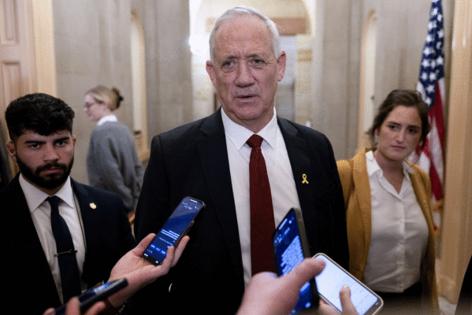Israel's war cabinet in turmoil but Netanyahu seen as secure
Published in News & Features
It certainly appeared crucial. Benny Gantz, ramrod straight and facing the cameras with gravity, told Prime Minister Benjamin Netanyahu to shift course on the Gaza war or he’d quit the three-man war cabinet. Israel, he said, needs “a government that will win the people’s trust.”
Coming days after the other war cabinet member, Defense Minister Yoav Gallant, bitterly accused Netanyahu of failing to have a postwar plan, it seemed that Netanyahu was being isolated by his two senior deputies, both former top generals, and Israel was headed toward political crisis.
But analysts on Sunday said Netanyahu’s governing coalition, 64 parliamentary seats out of 120, remains secure. Even if Gantz carries out his threat to resign by June 8 — not a certainty — little is likely to change in the short to medium term, they said. The war cabinet might collapse but Netanyahu would continue to rule with his far-right partners.
“Gantz’s chances of overthrowing the government are slim,” said Mazal Mualem, who’s written a recent political biography of Netanyahu. “There is almost no chance that members of Netanyahu’s Likud party will rebel against him, given the political cost. The second way is through massive public protest. But public sentiment isn’t there. Gantz’s move was a mistake.”
Nadav Strauchler, a political consultant, agreed, saying, “The power remains with Netanyahu. Gantz made a mistake to give him three weeks. If you’re going to shoot, don’t talk about it, shoot.”
All that said, if five Likud legislators do rebel or if Ultra-Orthodox coalition partners walk out over court-enforced efforts to draft their young men, Netanyahu would be in trouble and elections may result. And his extremist partners could push him to adopt policies that would lead to massive anti-government demonstrations and objections from Washington, either of which could lead to change.
Gantz, 64, who came in from the opposition to join the cabinet after Hamas attacked Israel on Oct. 7, killing 1,200 and abducting 250, helped plan and run the subsequent war in Gaza. Crisis created an uneasy unity among adversaries.
In the early weeks, all three members, dressed in black, would hold joint news conferences. Top U.S. officials, including President Joe Biden, came to Israel and joined in cabinet meetings to plot out how to stop Hamas and other Iranian-backed enemies of Israel from being able to attack again in such a manner.
Half a year later, the picture is very different. Israel says it’s killed 13,000 Hamas fighters and has reduced its missile arsenal and destroyed numerous weapons depots and strategic tunnels. But neither the militia nor its political structure is destroyed. Hamas’ top leaders remain in hiding. In negotiations to trade hostages for Palestinian prisoners, Hamas, considered a terrorist organization by the U.S. and European Union, is acting quite confident.
Meanwhile, much of Gaza has been reduced to rubble, its 2.3 million inhabitants are facing disease and hunger, and 35,000 people have been killed, according to Hamas officials, who don’t distinguish between fighters and civilians. The Biden administration is anxious and shares many of Gantz’s concerns.
...continued
©2024 Bloomberg L.P. Visit bloomberg.com. Distributed by Tribune Content Agency, LLC.







Comments